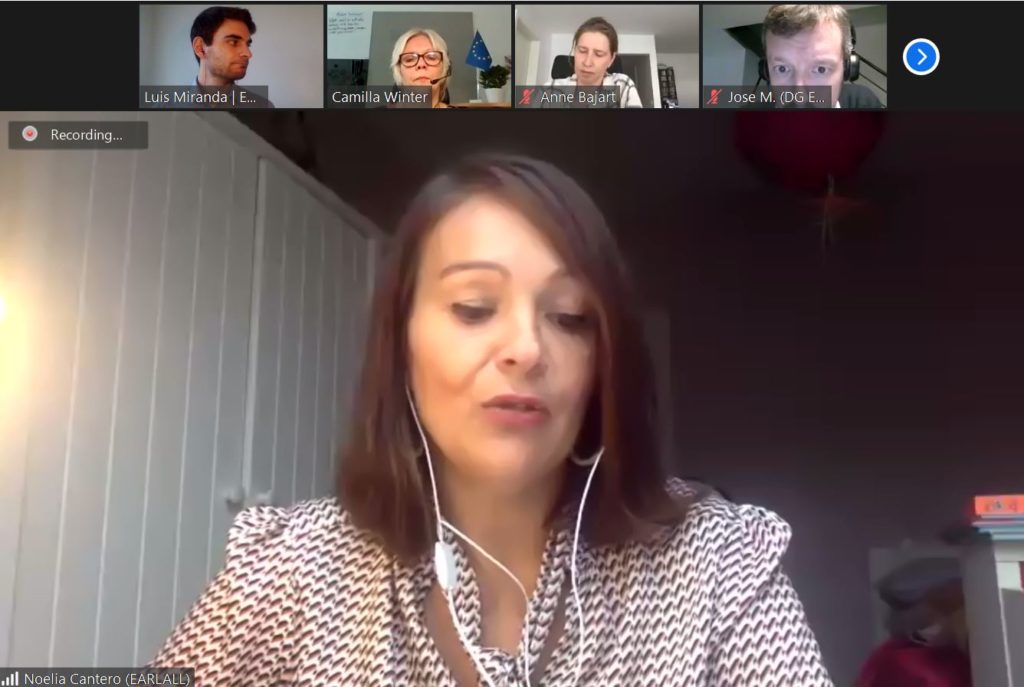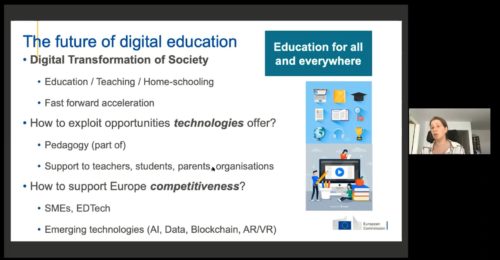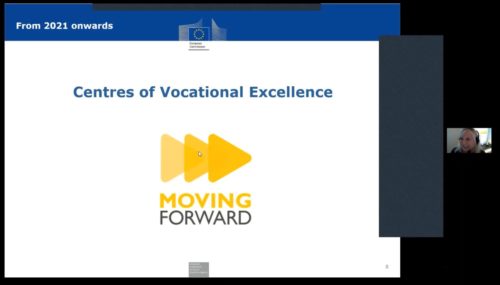EARLALL hosted online workshop on EU funds for resilient skills ecosystems
30/09/2020

On 28 September 2020, EARLALL and its Member Regions welcomed representatives from the European Commission at an online workshop during which key EU programmes to fund skills-related initiatives were introduced. Regional and local officers, VET and adult education school headmasters, and relevant stakeholders got first-hand information from the Commission about how they can participate in the upcoming programmes. Even if political negotiations about the EU’s next financial period are still ongoing at the Council and the details are uncertain, the main characteristics of the programmes have been already been set out and were shared by Commission representatives. The session was moderated by Camilla Winter (Adult Education Borås) and introduced by Noelia Cantero (EARLALL Director), who reminded that “cooperation is more needed now than ever.”
A general vision of the new Skills Agenda and the Council Recommendation on Vocational Education and Training (VET) was provided by Anna Barbieri (DG EMPL). The Skills Agenda’s implementation will be articulated into 12 key actions distributed in four building blocks: joining forces, tools for lifelong learning, skilling for a job, and unlocking investment. She also introduced the Commission’s vision for an inclusive, excellent and lifelong VET, and called for a strong commitment of stakeholders in achieving it. This will be done mainly through the upcoming Skills Pact, to be announced during the European Vocational Skills Week 2020 (9-13 November) and in which regions will play a key role.
Then, José Manuel Fernández (DG EAC) introduced the novelties of Erasmus+ programme for the 2021-2027 period from a policy point of view. Under a premise of evolution rather than revolution, the new Erasmus+ aims at being more inclusive, greener, more digital, simpler and forward-looking. Synergies with other EU programmes (ESF+, ERDF, Horizon Europe, etc.) will be encouraged, for example to scale up projects or top up funds. The programme will still be based on three main pillars, even if some changes are expected (for example, regarding mobility of school students): mobility, cooperation and policy development, along with the Jean Monnet actions. The programme guide is expected for the end of 2020.
On a more practical note, Michele Grombeer (EACEA) presented the Centres of Vocational Excellence initiative and its prospective calls under the new Erasmus+. This initiative is a pillar in the VET strategy and regional authorities will have a key role in it, with a big focus on regional smart specialisation strategies (RIS3), inclusion, and cooperation between education actors, the scientific community and businesses. Boosting innovation through cooperation and flow of knowledge among higher education and VET will be fostered under sector skills alliances, involving also the broad social economy environment, including research. More simplification is expected, although no major changes will be made to the programme.
 |
 |
Lyubomira Derelieva (DG EMPL) gave an overview of REACT EU and ESF+ (European Social Fund Plus). The ESF+ will work under three main principles: shared management between the Commission and Member States, a partnership with civil society and social partners, and co-financing. The specific objectives (11) of the fund for the next seven years include education and training as a key area, with a focus on improving education and training systems, equal access, and lifelong learning and skills anticipation, covering the entire education and training cycle with support both to people and reforms. On another note, REACT EU will provide 58.3 blln EUR of additional funds for the ESF+, ERDF (European Regional Development Fund) and FEAD (Fund for European Aid to the most Deprived) to foster crisis repair in the context of COVID-19.
Lastly, Anne Bajart (DG CONNECT) introduced digital education and learning in Europe. She presented the main actions of the Commission in response to the COVID-19 pandemic, including online platforms and disinformation, and skills, collaborative working and creativity. Then, she presented some examples of good practices, such as Horizon 2020 projects DEL4ALL, dealing with digital enhanced learning, and IMPACT EdTech, providing help to education technology start-ups.
Useful links
- Workshop report (published on 14 October 2020)
- Resilient Skills Ecosystems for a Crisis-proof Future initiative




